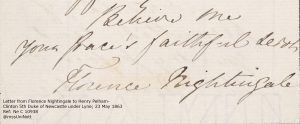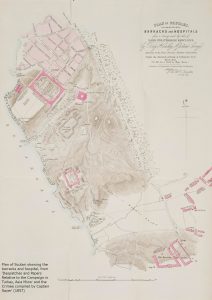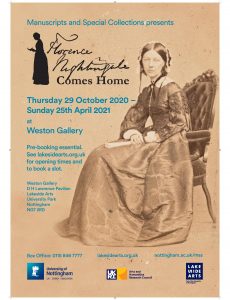October 27, 2020, by Kathryn Steenson
Florence Nightingale Comes Home to Lakeside Arts
UPDATE: Following local government guidance in relation to Tier 3 restrictions for Nottingham and Nottinghamshire, we regret we must close the Djanogly Gallery, Weston Gallery and the University of Nottingham Museum from Friday 30 October for a four-week period until Friday 27 November inclusive. Therefore we are currently not taking bookings for our exhibitions. For information and updates, see: https://www.lakesidearts.org.uk/welcome-back.html
It’s a few months later than planned, but we hope Florence Nightingale would understand why our new exhibition, exploring the life and enduring legacy of the world’s most famous nurse to celebrate the bicentenary of her birth, was delayed until this week.
Florence Nightingale Comes Home has been curated by experts at the University, including its Manuscripts and Special Collections team, Professor Paul Crawford from its School of Health Sciences and Dr Anna Greenwood and Dr Richard Bates in the School of History.

The exhibition, which is funded by the Arts and Humanities Research Council (AHRC), was intended to be shown in the Weston Gallery at Lakeside Arts in April but was postponed due to covid-19. An online version, including images of the items that were intended for display, will remain available for people unable to come and see the exhibition in person.
Visitors to the Gallery will be able to explore Nightingale’s family roots in Derbyshire, her work during the Crimean War, and her subsequent efforts to improve sanitary conditions at home and in institutions such as hospitals. It shows how Nightingale both embraced and rejected her fame. Visitors can learn of her upbringing in Derbyshire and how her ‘quiet and rural’ family home became a magnet for autograph hunters and sightseers. Items include commemorative figurines of Nightingale, poems composed in her honour, and contemporary celebrations of her work. Letters and diaries written by military surgeons, soldiers and politicians also show how she was viewed by those intimately involved in the Crimean conflict.
Professor Crawford, who leads the research project, said: “In this bicentenary year of the birth of Florence Nightingale we are all experiencing new challenges in remaining healthy at home during the Coronavirus pandemic. This exhibition provides a new and exciting account of how the home features in the life and work of the world’s greatest nursing leader.
“Never has the message about the importance of nurses been as pertinent as it is now. Florence Nightingale was a trailblazer for modern medicine and much of what she achieved is still represented in our hardworking NHS nurses today.”
Dr Richard Bates said: ‘We were very disappointed not to be able to open this exhibition in the spring – but are delighted that the public will now get the opportunity to visit, and find out about how Nightingale’s East Midlands connection connects to her famous work in the Crimean War and hospital reform.”
The exhibition will run from 29th October 2020 – 25th April 2021 at the Lakeside Arts Centre. Pre-booking is required to maintain social distancing in the Gallery, and tickets are available at https://www.lakesidearts.org.uk/welcome-back.html
No comments yet, fill out a comment to be the first



Leave a Reply